Published on March 4, 2012
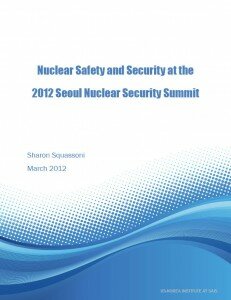 As Seoul prepares to host the 2012 Nuclear Security Summit, the meeting will probably resemble its predecessor in many ways. Three years after President Obama’s Prague speech, nuclear security still offers some of the “lowest hanging fruit” in terms of progress on the nuclear agenda. The context for the 2012 summit, however, is quite different. There is less optimism about progress toward nuclear disarmament, no resolution in sight for the challenges posed by the North Korean and Iranian nuclear weapons programs, and less optimism about peaceful nuclear energy following the devastating accident in March 2011 at the Fukushima Daiichi nuclear power plant in Japan.
As Seoul prepares to host the 2012 Nuclear Security Summit, the meeting will probably resemble its predecessor in many ways. Three years after President Obama’s Prague speech, nuclear security still offers some of the “lowest hanging fruit” in terms of progress on the nuclear agenda. The context for the 2012 summit, however, is quite different. There is less optimism about progress toward nuclear disarmament, no resolution in sight for the challenges posed by the North Korean and Iranian nuclear weapons programs, and less optimism about peaceful nuclear energy following the devastating accident in March 2011 at the Fukushima Daiichi nuclear power plant in Japan.
In this paper, Sharon Squassoni explores the intersections of nuclear safety and nuclear security and how this discussion will likely be addressed at the upcoming 2012 Seoul Nuclear Security Summit.
Download, “Nuclear Safety and Security at the 2012 Seoul Nuclear Security Summit,” by Sharon Squassoni.
Find related papers and resources on our Nuclear Security Summit pages.
Published on March 1, 2012
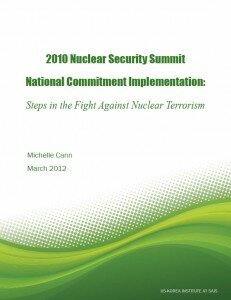 As a complement to the objectives detailed in the 2010 Washington Communiqué and Work Plan, a number of countries made national pledges to take specific measures to improve global nuclear security. These ranged from domestic, unilateral measures to cooperative, multinational contributions that bolster global nuclear security.
As a complement to the objectives detailed in the 2010 Washington Communiqué and Work Plan, a number of countries made national pledges to take specific measures to improve global nuclear security. These ranged from domestic, unilateral measures to cooperative, multinational contributions that bolster global nuclear security.
In advance of the Seoul Summit, this paper provides an overview of the steps that countries have taken to implement their voluntary, national commitments and demonstrates where needs and gaps of intention remain. The information in this report was obtained primarily from open source publications and is accurate as of February 2012.
Download “2010 Nuclear Security Summit National Commitment Implementation: Steps in the Fight Against Nuclear Terrorism,” by Michelle Cann.
For related papers, visit our Nuclear Security Summit page.
Published on February 29, 2012
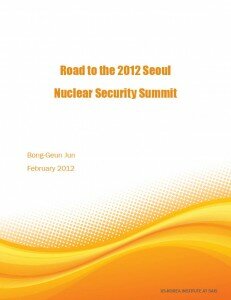 The second Nuclear Security Summit (NSS) will be held in Seoul, South Korea, on March 26-27, 2012. This summit, officially named “The 2012 Seoul Nuclear Security Summit,” will be the largest such meeting held in Korea in modern Korean history, just as the 2010 session was the largest summit ever held in Washington, DC.
The second Nuclear Security Summit (NSS) will be held in Seoul, South Korea, on March 26-27, 2012. This summit, officially named “The 2012 Seoul Nuclear Security Summit,” will be the largest such meeting held in Korea in modern Korean history, just as the 2010 session was the largest summit ever held in Washington, DC.
Dr. Bong-Geun Jun, Director of the Center for Nonproliferation and Nuclear Security at the Institute of Foreign Affairs and National Security (IFANS), discusses South Korean and international efforts to prepare for the 2012 Seoul Nuclear Security Summit and tries to answer key questions about Korea’s role in the NSS process.
Download “Road to the 2012 Seoul Nuclear Security Summit,” by Bong-Geun Jun.
For related presentations and papers, check out our Nuclear Security Summit program page.
Published on February 16, 2012
 As part of our Working Paper Series on the Nuclear Security Summit, Mark Fitzpatrick and Jasper Pandza (International Institute for Strategic Studies) discuss the purpose and progress of the NSS process and possible ways to maintain the momentum built by the process post 2012 in Seoul and 2014 in the Netherlands.
As part of our Working Paper Series on the Nuclear Security Summit, Mark Fitzpatrick and Jasper Pandza (International Institute for Strategic Studies) discuss the purpose and progress of the NSS process and possible ways to maintain the momentum built by the process post 2012 in Seoul and 2014 in the Netherlands.
Download “Maintaining High-Level Focus on Nuclear Security.”
For related presentations and papers, check out our Nuclear Security Summit program page.
Published on January 29, 2012
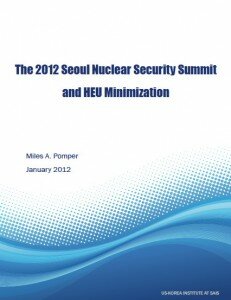 The US-Korea Institute at SAIS launches a new paper series focused on issues to be addressed at the upcoming Nuclear Security Summit in Seoul.
The US-Korea Institute at SAIS launches a new paper series focused on issues to be addressed at the upcoming Nuclear Security Summit in Seoul.
The first paper in this series examines the status of HEU minimization efforts and offers strategies for how to continue these efforts into the future. Find out more here.
Published on November 20, 2011
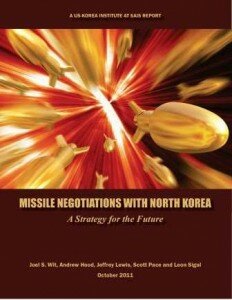 While public attention has been focused on restarting denuclearization talks with North Korea, an important component of any renewed dialogue with Pyongyang will be controlling its ballistic missile program. That effort has been moving gradually but steadily ahead since the North ended its unilateral test moratorium in 2006 with the further development of threatening technologies, as well as the deployment of new models. Secretary of Defense Robert Gates recently highlighted the dangers posed by this effort during his January trip to Asia. He stated, “With the North Koreans’ continuing development of nuclear weapons and their development of intercontinental ballistic missiles, North Korea is becoming a direct threat to the United States, and we have to take that into account.” growing nuclear weapons stockpile and increasingly capable delivery systems will pose a serious danger to the region, and eventually perhaps even to the United States. In short, if the Six Party Talks resume, a high priority for the United States will be to also start negotiations that cover missiles.
While public attention has been focused on restarting denuclearization talks with North Korea, an important component of any renewed dialogue with Pyongyang will be controlling its ballistic missile program. That effort has been moving gradually but steadily ahead since the North ended its unilateral test moratorium in 2006 with the further development of threatening technologies, as well as the deployment of new models. Secretary of Defense Robert Gates recently highlighted the dangers posed by this effort during his January trip to Asia. He stated, “With the North Koreans’ continuing development of nuclear weapons and their development of intercontinental ballistic missiles, North Korea is becoming a direct threat to the United States, and we have to take that into account.” growing nuclear weapons stockpile and increasingly capable delivery systems will pose a serious danger to the region, and eventually perhaps even to the United States. In short, if the Six Party Talks resume, a high priority for the United States will be to also start negotiations that cover missiles.
read more …
Published on September 15, 2011
 On September 22, 2011, the U.S.-Korea Institute at SAIS, in partnership with Peking University Center for International and Strategic Studies and Chung Ang University Graduate School of International Studies will host a one-day conference exploring the numerous political changes that will take place throughout Asia and the United States in 2012.
On September 22, 2011, the U.S.-Korea Institute at SAIS, in partnership with Peking University Center for International and Strategic Studies and Chung Ang University Graduate School of International Studies will host a one-day conference exploring the numerous political changes that will take place throughout Asia and the United States in 2012.
Panels will discuss what 2012 leadership may look like for the United States, South Korea, Japan, China, Russia and North Korea, as well as what the effects of these changes might have on regional security and security cooperation in the future.
For a full list of speakers and to RSVP, click here.
 As Seoul prepares to host the 2012 Nuclear Security Summit, the meeting will probably resemble its predecessor in many ways. Three years after President Obama’s Prague speech, nuclear security still offers some of the “lowest hanging fruit” in terms of progress on the nuclear agenda. The context for the 2012 summit, however, is quite different. There is less optimism about progress toward nuclear disarmament, no resolution in sight for the challenges posed by the North Korean and Iranian nuclear weapons programs, and less optimism about peaceful nuclear energy following the devastating accident in March 2011 at the Fukushima Daiichi nuclear power plant in Japan.
As Seoul prepares to host the 2012 Nuclear Security Summit, the meeting will probably resemble its predecessor in many ways. Three years after President Obama’s Prague speech, nuclear security still offers some of the “lowest hanging fruit” in terms of progress on the nuclear agenda. The context for the 2012 summit, however, is quite different. There is less optimism about progress toward nuclear disarmament, no resolution in sight for the challenges posed by the North Korean and Iranian nuclear weapons programs, and less optimism about peaceful nuclear energy following the devastating accident in March 2011 at the Fukushima Daiichi nuclear power plant in Japan.






